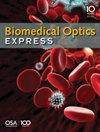Variation of skin hydration profile with biophysical factors and lifestyle revealed by in vivo terahertz sensing.
IF 2.9
2区 医学
Q2 BIOCHEMICAL RESEARCH METHODS
引用次数: 0
Abstract
The skin, being the body's largest organ, plays a pivotal role in protecting the body against dangerous external factors. The maintenance of adequate hydration levels is essential for the skin to fulfill this protective function. However, skin hydration depends upon different biophysical factors and lifestyles, such as ethnicity, sex, age, water consumption, and many more. Consequently, methods to assess skin hydration in a precise and non-invasive manner are in high demand. In this paper, using a portable and handheld terahertz (THz) probe, we systematically examine the correlation between diverse biophysical factors and skin hydration profile in a population exceeding 300 participants. Through comparative analysis of THz light reflected from the skin against a dielectric model, we successfully extracted the thickness and hydration percentage of the outermost layer of the epidermis, the stratum corneum (SC). Our findings indicate that SC hydration and thickness are associated with variables such as daily water consumption, age, drinking coffee, and exercise. Additionally, our measurements reveal distinctions in the skin's hydration properties concerning susceptibility to UV-induced effects by bringing in the Fitzpatrick skin types. This THz-based technique holds the potential for facile integration into clinical settings for the evaluation and diagnosis of various skin-related conditions.活体太赫兹传感技术揭示皮肤水合状况随生物物理因素和生活方式的变化。
皮肤作为人体最大的器官,在保护人体免受外界危险因素侵害方面发挥着举足轻重的作用。保持足够的水合水平对皮肤发挥这一保护功能至关重要。然而,皮肤的水合作用取决于不同的生物物理因素和生活方式,如种族、性别、年龄、饮水量等。因此,以精确和非侵入性的方式评估皮肤水合度的方法需求量很大。在本文中,我们使用便携式手持太赫兹(THz)探头,在超过 300 名参与者中系统地研究了各种生物物理因素与皮肤水合状况之间的相关性。通过对皮肤反射的太赫兹光与介电模型进行比较分析,我们成功提取了表皮最外层角质层(SC)的厚度和水合比例。我们的研究结果表明,角质层的水合作用和厚度与日常饮水量、年龄、喝咖啡和运动等变量有关。此外,我们的测量还揭示了皮肤水合特性的差异,这些差异与菲茨帕特里克皮肤类型对紫外线诱导效应的敏感性有关。这种基于太赫兹的技术有望方便地应用于临床环境,以评估和诊断各种皮肤相关疾病。
本文章由计算机程序翻译,如有差异,请以英文原文为准。
求助全文
约1分钟内获得全文
求助全文
来源期刊

Biomedical optics express
BIOCHEMICAL RESEARCH METHODS-OPTICS
CiteScore
6.80
自引率
11.80%
发文量
633
审稿时长
1 months
期刊介绍:
The journal''s scope encompasses fundamental research, technology development, biomedical studies and clinical applications. BOEx focuses on the leading edge topics in the field, including:
Tissue optics and spectroscopy
Novel microscopies
Optical coherence tomography
Diffuse and fluorescence tomography
Photoacoustic and multimodal imaging
Molecular imaging and therapies
Nanophotonic biosensing
Optical biophysics/photobiology
Microfluidic optical devices
Vision research.
 求助内容:
求助内容: 应助结果提醒方式:
应助结果提醒方式:


